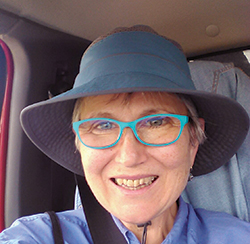Leukemia Survivor
A Higher Quality of Life After Cancer

Although Ahava Goldwater loved being a middle school math teacher in an inner city school, the stress of it took its toll on her long before hairy cell leukemia was diagnosed. She quit her job thinking it had exhausted her and used her teaching skills to home school her three children. During that time, her first husband passed away. She later remarried, and her second husband, Gary, a certified educator, helped her teach her children. After her recovery, she returned to her passion for teaching by tutoring at a high school and later at a private school.
My hairy cell leukemia was diagnosed in 1995 when I was 41. When I look back, I realize I had a lot of symptoms. But what caused me to go to the doctor was pain in my hip. A friend actually convinced me to go because we thought it might be a type of arthritis. It turns out the hip pain was not related to the leukemia.
After being shuttled around to many doctors because my doctor was on maternity leave, the doctor called me in to give me the results of the blood tests. She told me she was sorry to tell me I had leukemia, and she asked if she could call someone for me. I guess I was in shock because I said “no.” But I prayed, “Let me live, I have three little kids.” I discovered that I had a type of cancer that mostly old men get.
The doctor also found that my spleen was 10 times bigger than it should have been which can often be a symptom of hairy cell leukemia.
I opted to have chemotherapy. At the time, two types of chemotherapy were available. Within about three weeks, I started my chemotherapy.
It all happened so fast that I really didn’t have any time to do research. In 1995, the Internet was barely up and running. But my husband did search online for information before I started chemotherapy.
I spent one week receiving chemotherapy via an infusion. Although the side effects weren’t terrible, it was like I had shaved several points off my IQ. It felt like I could only read at a sixth-grade level. It took me one week to read a very simple book. But, I didn’t have any nausea or lose my hair.
The chemotherapy also made me very weak. My friends often joke about one day when we had to walk up a steep hill. They were all at the top while I was still at the bottom because I could barely climb it. They still laugh when they tell how they had to push me to help me get up that hill. I made it to the top. I was worn out, but I made it.
After one week of chemotherapy, it took about a year and a half before I started to feel pretty good. My blood counts slowly improved to just below normal. But then my husband died and my blood counts crashed. My doctor and I discussed if I should go through a second round of chemotherapy, but we decided there were more negatives than positives. The doctor felt my blood could rebuild on its own. So, over the years, I was monitored and things improved and now I’m in complete remission. I later remarried, and my second husband was diagnosed with bladder cancer. His cancer is now in complete remission, and we joke about being the cancer couple. We now visit other people with cancer to help cheer them up.
For a long time, my children were very afraid that I was going to die. Gavriella, Avi and David became very protective of me. Gavriella didn’t even want to move away to go to college for fear I would relapse. Now they aren’t so afraid because I’m cancer free.
I discovered that a lot of good can come out of having cancer. I certainly don’t recommend cancer, but it helped me to discover what and who are really important in life. Some people I thought were my friends turned out to be selfish. Others became absent in my life. But other people I barely knew stepped up and supported me and my family.
I took my health seriously. I changed my diet and started to manage my stress much better. I began to use strategies like massage and acupuncture. Reducing stress in my life made things so much better.
I learned to deal with uncertainty because there are no certainties in life. In fact, I had other minor cancers develop after my treatment for leukemia that were unrelated. But I figured I beat the big one, I can handle the minor ones.
It’s really important to try to be honest with yourself and your doctor about how you’re feeling and what scares you. I certainly had moments of great terror through the journey. But people need to see the positive in life even though it might be hard to do after being diagnosed with cancer. Don’t be afraid to ask for support. Some people may disappear in your life, but others will step up and help. Let them do it. It can be a really great experience and it allows them to feel good helping you. It will be an experience neither of you will forget.


